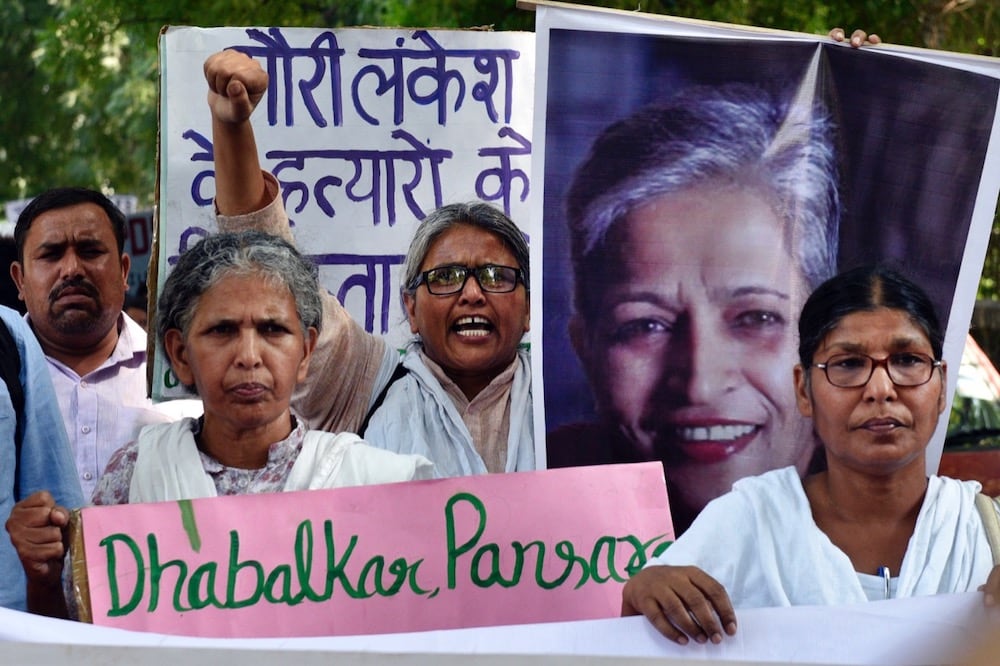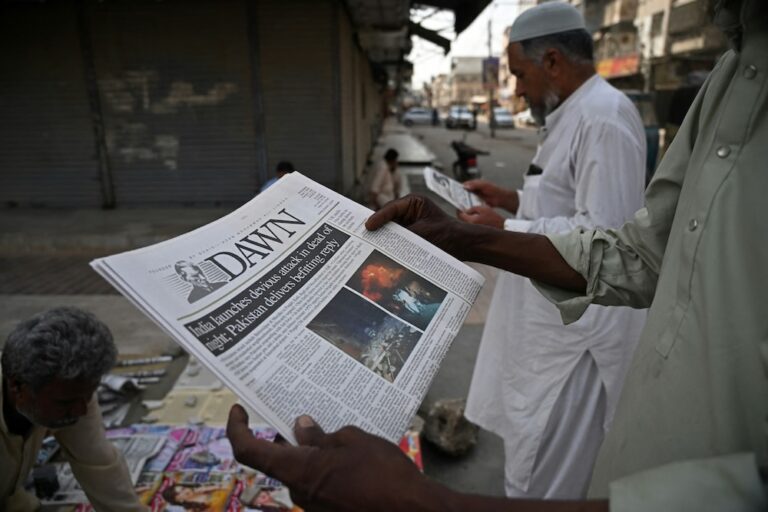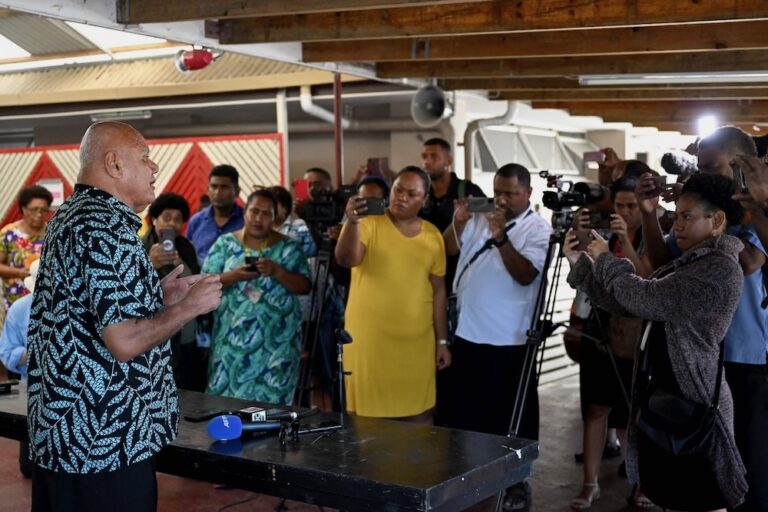The International Press Institute has joined with seven print and online media outlets in Bangladesh, India, Nepal, and Pakistan to launch an ad campaign aimed at raising public awareness about the need to protect press freedom.
This statement was originally published on ipi.media on 9 December 2022.
On Human Rights Day, the IPI global network calls for action to protect freedom of the press and the safety of journalists in South Asia, amid increasing attacks on independent journalism and waning respect for human rights by governments across the region.
To mark Human Rights Day on December 10, IPI has joined with seven print and online media outlets in Bangladesh, India, Nepal, and Pakistan to launch an ad campaign aimed at raising public awareness about the need to protect press freedom as an essential pillar of democracy and human rights.
The ads will run in The Daily Star in Bangladesh, in The Wire, Scroll.in, and the News Minute in India, in Dawn in Pakistan, and Nagarik (in Nepali) and myRepublica (in English) in Nepal. This campaign is part of IPI’s ongoing cross-border project that brings together partner media outlets in these countries to create public awareness about attacks on journalists and to highlight the erosion of press freedom across the region.
India: Attacks against journalists, legal harassment, market capture
There has been an alarming deterioration of press freedom in India since the nationalist conservative Bharatiya Janata Party led by Prime Minister Narendra Modi came to power in 2014. Over the past eight years, the Modi government and BJP supporters have attempted to silence independent media through attacks and repressive laws. The media landscape is increasingly captured by pro-government interests that spread BJP propaganda. Journalists and media outlets that report critically on the government face physical and verbal attacks, arrest, and censorship. Many journalists have been arrested under anti-terrorism, sedition, and other criminal laws, which has led to self-censorship.
Journalists’ work is also greatly hindered by internet shutdowns in India, where the government in 2021 ordered the world’s highest number of network shutdowns for the fourth year running, according to Access Now. Of the 106 shutdown incidents in the country that year, 85 were in the Indian-administered Kashmir, a predominantly Muslim region that the Modi government stripped of its semi-autonomy in 2019 and is today one of the world’s most restrictive environments for journalists.
Impunity for attacks and crimes against journalists in India is unacceptably high. It takes years before cases make it to trial when they are investigated at all. Such is the case of journalist and activist Gauri Lankesh, who was shot dead in September 2017. Her murder sparked nationwide protests, compelling authorities to open a special investigation. Eighteen people have been arrested in connection with this crime and the prosecution’s case links them to far-right Hindu terror groups. After years of stalled proceedings, a trial began in July 2022.
Pakistan: Impunity prevails
The election of Prime Minister Shehbaz Sharif in April 2022 brought initial hopes for an improved climate for press freedom in Pakistan. However, journalists continue to face physical attacks, verbal threats, legal harassment, arrests, and censorship. While the Supreme Court struck down the highly controversial Section 20 of the 2016 Prevention of Electronic Crimes Act (PECA) that criminalized defamation and that was frequently used to punish critical journalists and political opponents, other laws including sections of the Pakistan Penal Code continue to be used to muzzle the press.
Although lawmakers recently passed national and regional legislation aimed at protecting the safety of journalists and tackling impunity, Pakistan remains one of the most dangerous countries in the world for the press and impunity for attacks against journalists remains staggeringly high. An estimated 96 percent of cases of killed journalists have gone unpunished. This includes the killing of Shan Dahar, bureau chief for Abb Takk Television channel in the Larkana district of Pakistan’s Sindh province, who was shot dead on January 1, 2014. An initial police investigation claimed the death was the result of stray gunfire, but Dahar’s colleagues and family believe he was targeted for his journalistic work.
Bangladesh: Attacks and authoritarian laws stifle press freedom
In Bangladesh, draconian laws restricting the work of independent journalism are choking press freedom and democracy. In addition to the Digital Services Act, which has been used to target hundreds of journalists since it was introduced in 2018, numerous other criminal laws are being deployed to muzzle and harass the independent press.
The media landscape in Bangladesh is flooded with pro-government outlets, leaving little room for independent news and information. Amidst intensifying pressure from the authorities and the owners of media outlets, journalists operate in a climate of heavy self-censorship.
In addition, there is a pervasive culture of impunity for crimes against journalists in Bangladesh, with authorities too often either failing to investigate killings and other attacks or cases stagnating in courts. More than two decades have passed since journalist Shamsur Rahman, a prominent journalist of Jashore, was shot dead by two armed assailants. His family still awaits justice.
Nepal: Political interference, legal restrictions, and harassment
Journalists in Nepal faced intense pressure in the lead-up to the general election this November, as authorities tightened controls over online media and attacks against journalists and media outlets increased. These pressures came amid an already fragile environment for press freedom in Nepal, where journalists operate in an uncertain and intimidating environment and regularly face threats, restrictive laws, and arrests.
Despite the constitution’s commitment to “full freedom of the press”, political interference in media outlets remains rampant and independent journalism in Nepal is hampered by a myriad of restrictive laws, including provisions in the country’s penal code. Nepal’s Electronic Transactions Act of 2006 (ETA) continues to be deployed by the government to stifle freedom of expression and to punish journalists who publish critical news or opinions on social media and online. At the same time, harassment against journalists in Nepal has been spreading on social media platforms, with female journalists being the frequent targets of especially vicious attacks.
This campaign is part of IPI’s ongoing cross-border project that brings together partner media outlets in India, Pakistan, Bangladesh, and Nepal to create public awareness about attacks on journalists and highlight the erosion of press freedom across South Asia. Partners include The Daily Star in Bangladesh; The Week – Malayala Manorama, The Wire, Scroll.in, and the News Minute in India; Dawn in Pakistan; as well as Nagarik (Nepali) and myRepublica (English) in Nepal.



